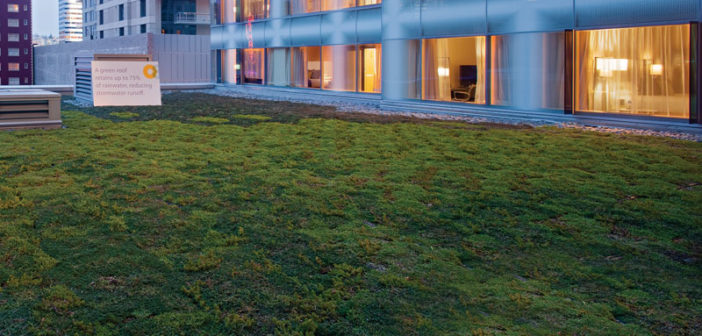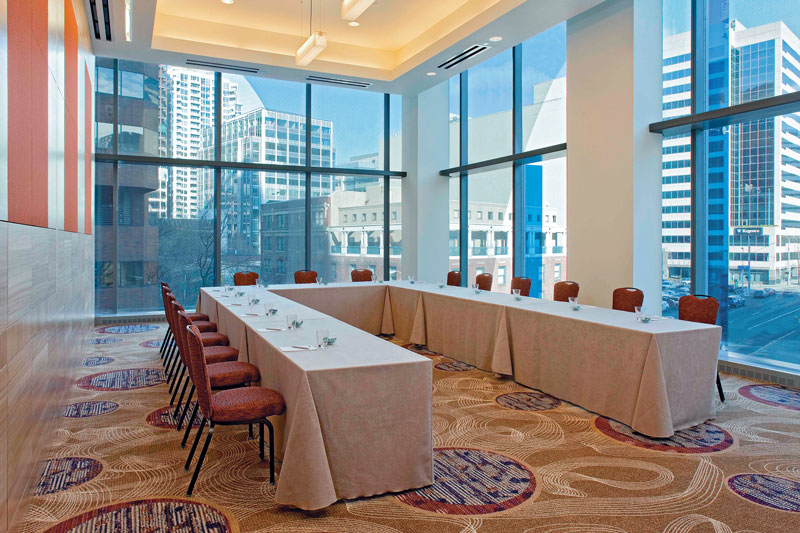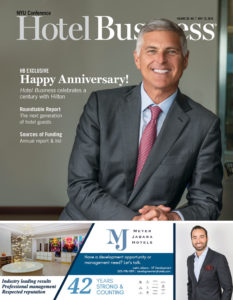SEATTLE—The Hyatt at Olive 8 was the Emerald City’s first LEED-certified hotel—but that’s not where the hotel’s sustainable practices end. Eco-friendly fixtures, recycling and energy efficiency all helped to earn the hotel its LEED Silver certification by the U.S. Green Building Council in July 2009, a 4 Green Key Eco-Rating in 2010 and its Green Seal certification in September 2012. For this property, though—and its guests—it’s important to keep innovating and finding new ways to help sustainability efforts.
“We’re proud to be an industry leader in going green and setting the trend in Seattle for other hotels around us—it shows our dedication to making our community stronger and leaving Seattle in a better state than how we found it,” said Steve Vissotzky, general manager, Hyatt at Olive 8. “Our certification shows we exemplify environmental leadership by meeting the highest green building standards and that we are an environmentally responsible, healthy place to live and work. We pride ourselves on the green initiatives we have put into place.”
Eco-consciousness begins with the hotel’s staff employing green practices. For housekeeping operations specifically, the hotel uses Green Seal-approved low-VOC cleaners and offers 100% toxin-free dry-cleaning services for guests.
Also for guests are the in-room lighting features, which are controlled by guestroom keys; when guests leave, the lights automatically shut off when the key is removed from the slot.
“Many of our initiatives are guest facing,” Vissotzky said. “Hyatt at Olive 8 rooms contain low-flow fixtures, and we incorporate bath towel reuse. Additionally, bulk shampoo, conditioner and body wash containers are found in each shower. Every element is designed to help reduce our carbon footprint.”
According to the GM, 23% less power is used overall as compared to a non-LEED certified building of similar size and scope, while 2.4 million gallons of water are saved each year (36% less water is used overall as compared to a non-LEED certified building of similar size) by low-flow plumbing fixtures, a low-chemical mechanical water system and other LEED efforts. The rooms also feature dual-flush toilets, which use 29% less wastewater as compared to traditional, single-flush toilets.
“Locals and visitors alike are looking for sustainable offerings and amenities. For some, it may be a determining factor for staying at the hotel, and for others, it may be a bonus. As it is a growing trend to be ‘green,’ guests expect there to be some initiatives toward doing so,” he said.
The hotel’s Elaia Spa was also built around sustainable efforts, using organic, locally sourced products for every treatment.
Leisure guests aren’t the only travelers benefitting from the operations, either. Hyatt at Olive 8 pays special mind to its business travelers as well, a group that has also come to expect these eco-conscious efforts. Although the hotel sees a mix of both leisure and business travelers, other than the summer, the other seasons tend to bring in more of the business crowds.
Companies and groups can book “green meetings” at the hotel with locally sourced menus, recycled paper materials and filtered water, Vissotzky said.
“Savvy business travelers expect us to continue evolving with sustainability efforts,” he said. “This subject is constantly progressing, and it is important to stay on top of trends and adapt to such trends. We have to strive to not become comfortable with the status quo and continue to be leaders in the hospitality industry with our sustainability efforts.”
The hotel is also in the process of developing new initiatives that will incorporate its 8,355-sq.-ft. green rooftop, one of the largest in downtown Seattle. Other efforts include food composting, implementing in-room recycling containers and food bank donations.
“We’re constantly looking for new ways to add to our sustainability practices and continue to look at how we can reduce our ecological footprint,” Vissotzky said.
The building itself is made of 20% recycled content, 95% of construction waste was diverted from landfills, and 100% of the paint, solvent and carpeting contain low- or no-VOC.
While location happens to be what sets this space apart in terms of city firsts, it’s also the reason a hotel like this is needed in the area. Seattle itself represents the juxtaposition of city and sustainable, and the hotel an eco-friendly hub amid a metropolis.
“Seattle is surrounded by beautiful landscape, but being in the heart of the city means we’re enclosed by buildings, not all of which are green,” Vissotzky said. “With the forests, mountains and accompanying nature around us, it’s important for the city to try and reduce its ecological footprint. As Seattle is increasingly becoming more eco-friendly and going green, Hyatt at Olive 8 fits right into place as a green hotel.” HB



